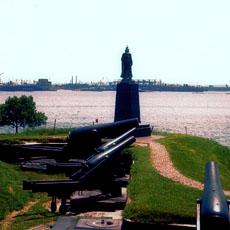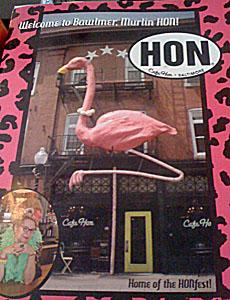STEVE EMBER: Welcome to THIS IS AMERICA. I'm Steve Ember.
FAITH LAPIDUS: And I'm Faith Lapidus. This week on our program, we tell you about the past and present of the city of Baltimore, Maryland.
(MUSIC)
STEVE EMBER: We start with the name. Many Baltimore natives pronounce it "Bawlmer" or "Bawl-ah-mur." This is just one example of Bawlmerese. Later in our program, we'll give you a lesson in this local way of speaking in Baltimore.
Baltimore is a historic port city in the eastern United States, 60 or so kilometers from Washington. Baltimore had about 20,000 people when it became a city at the end of 1796. Last year's national census count estimated the population at 621,000. Baltimore is the largest city in the state of Maryland.
(MUSIC)
Visitors to Baltimore find entertainment in areas like the redeveloped Inner Harbor and the waterfront community of Fells Point. Yet many people around the world only know the areas of Baltimore shown on TV dramas like "Homicide: Life on the Street" and "The Wire."
(MUSIC)
David Simon created "The Wire" based largely on his years as a newspaper reporter covering crime for the Baltimore Sun. But, in real life, murder rates are down from the highs fueled by the violent drug trade of years past.
FAITH LAPIDUS: The first settlers came to the area in the middle of the 1600s. The settlement was named Baltimore Town in honor of Lord Baltimore of England.
Maryland was one of the 13 British colonies that declared their independence and formed the United States in 1776. Baltimore served as the nation's capital for two months during the American Revolution.
America and Britain went to war again in 1812. American ships sailed from Baltimore Harbor into the Chesapeake Bay and the Atlantic Ocean and attacked British ships.
As a result of these attacks, Baltimore became a target. In September of 1814, British ships attacked Fort McHenry in Baltimore Harbor.
The attack lasted all night. An American lawyer and poet named Francis Scott Key was on a ship in the harbor. He wrote a poem about the huge American flag that he saw flying over Fort McHenry. He wondered, would it still be there after the battle was over? It was.
Key's poem, set to music, became popular. Then, many years later, on March 3rd, 1931, "The Star-Spangled Banner" officially became America's national anthem.
The earliest known copy of the poem in Francis Scott Key's own handwriting is housed at the Maryland Historical Society in Baltimore. But for the next three months it will be shown at Fort McHenry. The national monument is celebrating the opening of a new, 15-million-dollar visitors center. The celebration also marks the 80th anniversary of Congress' declaring "The Star-Spangled Banner" as the national anthem.

STEVE EMBER: During the 1800s, Baltimore grew as a business center. It has one of the largest natural harbors in the world. Ships carried goods to and from Europe and South America.
Ships also brought immigrants to America by way of Baltimore. The city was once a major port of entry, second only to Ellis Island in New York Harbor.
Baltimore also became a banking center and a center of education and medicine. The city has a well-known university and hospital that are both named after Johns Hopkins. He was a businessman who died in 1873.
FAITH LAPIDUS: During the 1900s, Baltimore continued to grow. Factories produced airplanes, chemicals, electronic equipment, ships and steel.
By the 1950s, however, the economy began to fall apart. Racial tensions grew. Whites began to leave the city. Today, black residents are more than 60 percent of the population.
STEVE EMBER: Over the years, the city of Baltimore has worked to give itself a facelift. The best known redevelopment project is called the Inner Harbor. An area once full of old factories and empty warehouses now has stores and restaurants, a science center and an aquarium. There are hotels, office buildings and places to live.
The Fort McHenry national monument is nearby. So are the two sports stadiums where Baltimore's major-league baseball and football teams, the Orioles and the Ravens, play. The Ravens are named after the famous scary poem "The Raven" by Edgar Allan Poe. The 19th-century writer lived, and died, in Baltimore.
FAITH LAPIDUS: People like to say that Baltimore is a city with real character in its neighborhoods. Many of these neighborhoods have row houses. These are homes, often tall and narrow, that are connected to one another. Many were built in the 18th and 19th centuries.
Some neighborhoods have an ethnic connection. These areas are known by names like Little Lithuania and Little Italy and Greektown. Many are popular for their restaurants.
STEVE EMBER: People hungry for fine art can find it at the Baltimore Museum of Art. But the city also has the American Visionary Art Museum, a museum that celebrates the work of self-taught individuals.
The National Museum of Dentistry is also in Baltimore. And so is the Baltimore and Ohio Railroad Museum. It has one of the largest collections of locomotives and rail cars in the world.
(MUSIC)
FAITH LAPIDUS: Baltimore is the home of a quirky, accented English spoken in some neighborhoods. Bawlmerese is a strong regional dialect that can be difficult to understand, even for native English speakers.
In some areas of Baltimore, women call almost everyone "Hon" -- short for Honey. Some Baltimoreans leave out letters in many words, like saying "Bawlmer" instead of Baltimore. And sometimes they add letters. For instance, they might call the nearby Patapsco River the "Patapsico."
Walk into a restaurant and the waitresses might yell out "Hi hon, how you doin'?" In fact, there is a restaurant called the Cafe Hon. The owner, Denise Whiting, was born in Baltimore. We asked her about her city.
DENISE WHITING: "I think Baltimore is a city that embraces you and gets a strong hold on you and it's very hard for people to leave once they get here. There's just something magical and warm and embracing and loving about Baltimore that you just don't find in other cities."

STEVE EMBER: Denise Whiting says she speaks Bawlmerese and so does her menu. Listen to how she pronounces "sandwiches."
DENISE WHITING: "Sammiches. I mean, and on the menu we try to really embrace our Baltimorese. We embrace our heritage, we embrace our culture, we embrace where we came from."
FAITH LAPIDUS: Our own Steve Ember was born and raised in Baltimore, so he knows that language well. But the tradition in American broadcasting is to use an unaccented English, often called "Midwestern-neutral." That way almost anyone across the country -- or across the world -- can understand it.
Steve has been speaking to us in VOA Special English for over 25 years. But now he is going to give us a little lesson in his native Bawlmerese.
STEVE EMBER: OK, Hon, here we go. I was born in Baltimore, Maryland.
FAITH LAPIDUS: Yes, I said that: You were born in Baltimore, Maryland.
STEVE EMBER: There's many things I remember about my old home town.
FAITH LAPIDUS: There are many things you remember about your home town.
STEVE EMBER: You're good! When I was growing up over there, we had two famous sports teams – The "O's" – That's short for the Orioles, the baseball team, and the Colts football team. They played their home games at the old Memorial Stadium.
FAITH LAPIDUS: OK – When you were growing up over there, there were two famous sports teams, the "O's" – that's the Orioles, the baseball team, and the Colts, the football team. And they played their home games in the old Memorial Stadium. Of course, the Colts are now gone, and we have the Ravens.
STEVE EMBER: Exactly. Now, all the fans would enjoy half-smokes and Natty-Boh's – That's National Bohemian, the local brew. It's not brewed locally anymore, but all the folks in Baltimore still call it their own.
FAITH LAPIDUS: Half-smokes – Those are frankfurters, and Natty-Boh's? National Bohemian, the local beer!
STEVE EMBER: Exactly!
FAITH LAPIDUS: And it's not brewed there anymore, but all the folks in Baltimore still call it their own.
STEVE EMBER: You could communicate with a Baltimorean beautifully!
FAITH LAPIDUS: Well, I'm now going to read some sentences using words that I know many Baltimoreans pronounce differently. Then Steve will translate them into Bawlmerese. Here we go:
Baltimore is the largest city in Maryland. It is on the Atlantic coast. The city has one of the oldest free public-library systems in the country, as well as a large seaport.
STEVE EMBER: (Steve in Bawlmerese)
Baltimore is the largest city in Maryland. It is on the Atlantic coast. The city has one of the oldest free public-library systems in the country, as well as a large seaport.
FAITH LAPIDUS: On summer Saturdays, after a breakfast of eggs and orange juice and a quick wash and rinse of the dishes in the sink and a quick trip to the bathroom, many people cut their lawns, using power mowers, being careful not to cut the flowers along the walk.
STEVE EMBER: (Steve in Bawlmerese)
On summer Saturdays, after a breakfast of eggs and orange juice and a quick wash and rinse of the dishes in the sink and a quick trip to the bathroom, many people cut their lawns, using power mowers, being careful not to cut the flowers along the walk.
FAITH LAPIDUS: Then, if the sun is too hot, they open the front door, sit on the stoop, eat a few sandwiches, watch their children play, listen to the police and fire sirens in the distance, and hope their arthritis pain goes away.
STEVE EMBER: (Steve in Bawlmerese)
Then, if the sun is too hot, they open the front door, sit out their on the stoop, eat a few sandwiches, watch their children play, listen to the police and fire sirens in the distance, and hope their arthritis pain goes away.
FAITH LAPIDUS: On Sundays many folks in Baltimore like to go down to the ocean or maybe drive over to visit Washington, which is right down the road.
STEVE EMBER: (Steve in Bawlmerese)
On Sundays many folks in Baltimore like to go down to the ocean or maybe drive over to Washington, which is right down the road.
(MUSIC)
I'm Steve Ember, hon.
FAITH LAPIDUS: And I'm Faith Lapidus. You can find transcripts and MP3s of our programs at voaspecialenglish.com. Steve has taken many photos of Baltimore over the years, including just this past week for our story, and we'll post some of them on our site. We'll also post an extended sample of Bawlmerese.
STEVE EMBER: You can also find us on Facebook at VOA Learning English and on Twitter. Our program was written with help from Christopher Cruise and produced by Brianna Blake. Join us again next week for THIS IS AMERICA in VOA Special English. See yas later, hons.
frankfurter: a long thin smoked sausage with a reddish-brown skin, often eaten in a long bread roll as a hot dog 法兰克福熏肠(常用于做热狗)
arthritis: a disease that causes pain and swelling in one or more joints of the body 关节炎
Identifying American Accents 辨别美语口音
(来源:VOA 编辑:崔旭燕)
